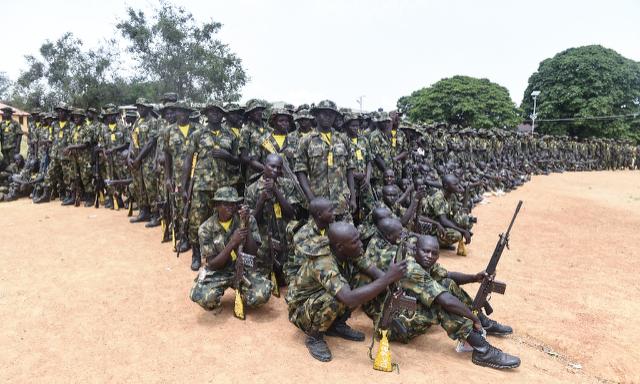At least three soldiers were killed and another six others were wounded in a Boko Haram raid in northeast Nigeria, the military said on Sunday, in the latest attack in the restive region.
The attack happened on Saturday evening when a large number of jihadists stormed Magumeri, some 50 kilometres (30 miles) north of the Borno state capital, Maiduguri.
The town and surrounding area have been attacked before by fighters from the Islamic State-group supported factional leader of Boko Haram, Abu Mus’ab al-Barnawi.
In July, at least 69 people — most of them soldiers and civilian militia members — were killed in an ambush on a heavily armed convoy escorting an oil exploration team.
Colonel Timothy Antigha, a spokesman for 8 Task Force Division Nigerian Army, said the Islamist militants first attacked a forward operating base in Magumeri but were repelled.
“The troops fought gallantly. Unfortunately, three soldiers lost their lives while six others sustained injuries,” he said in an emailed statement.
A military source in Maiduguri told AFP the Boko Haram fighters responsible were suspected to have come from Dabar Masara, an island on Lake Chad, where Barnawi faction loyalists are known to have been hiding.
– ‘Classic’ tactic –
The military source described Saturday’s attack as a “huge invasion” and said troops were forced to withdraw after a “fierce” battle until back-up could arrive.
“Reinforcements were later deployed and they engaged the terrorists, pushing them out of the town, which is now under the full control of the Nigerian military,” he said on condition of anonymity for security reasons.
“Civilians who had fled into the bushes have begun returning to their homes.”
A member of the Civilian Joint Task Force (CJTF) added: “Boko Haram briefly took over Magumeri yesterday (Saturday) after pushing soldiers out of the town.
“Civilians fled as well. But later more soldiers were sent and they took over the town from Boko Haram.”
But he said Boko Haram was only in the town for several hours until early Sunday.
“This is a classic Boko Haram attack: to loot supplies and assert their presence. Even if troops hadn’t deployed they would have withdrawn after looting and destruction,” the CJTF member said.
Boko Haram seized large parts of Borno and the neighbouring states of Adamawa and Yobe in 2014, as part of its quest to establish a hardline Islamic state in the remote northeast region.
Violence linked to the insurgency has left at least 20,000 dead and made more than 2.6 million people homeless since 2009.
But a military counter-insurgency, begun in early 2015, has left Boko Haram largely reliant on smash-and-grab raids for food and supplies, and now lacks the resources or manpower to hold any substantial territory.
Nigeria’s President Muhammadu Buhari said in December 2015 the group was “technically” defeated.
Yet civilians remain vulnerable from hit-and-run raids and an increased use of suicide bombers: this week, at least 50 people were killed in Adamawa, when a teenage boy set off his explosives at a mosque in the town of Mubi.
Attacks persist across the border, particularly in Cameroon’s far north.














